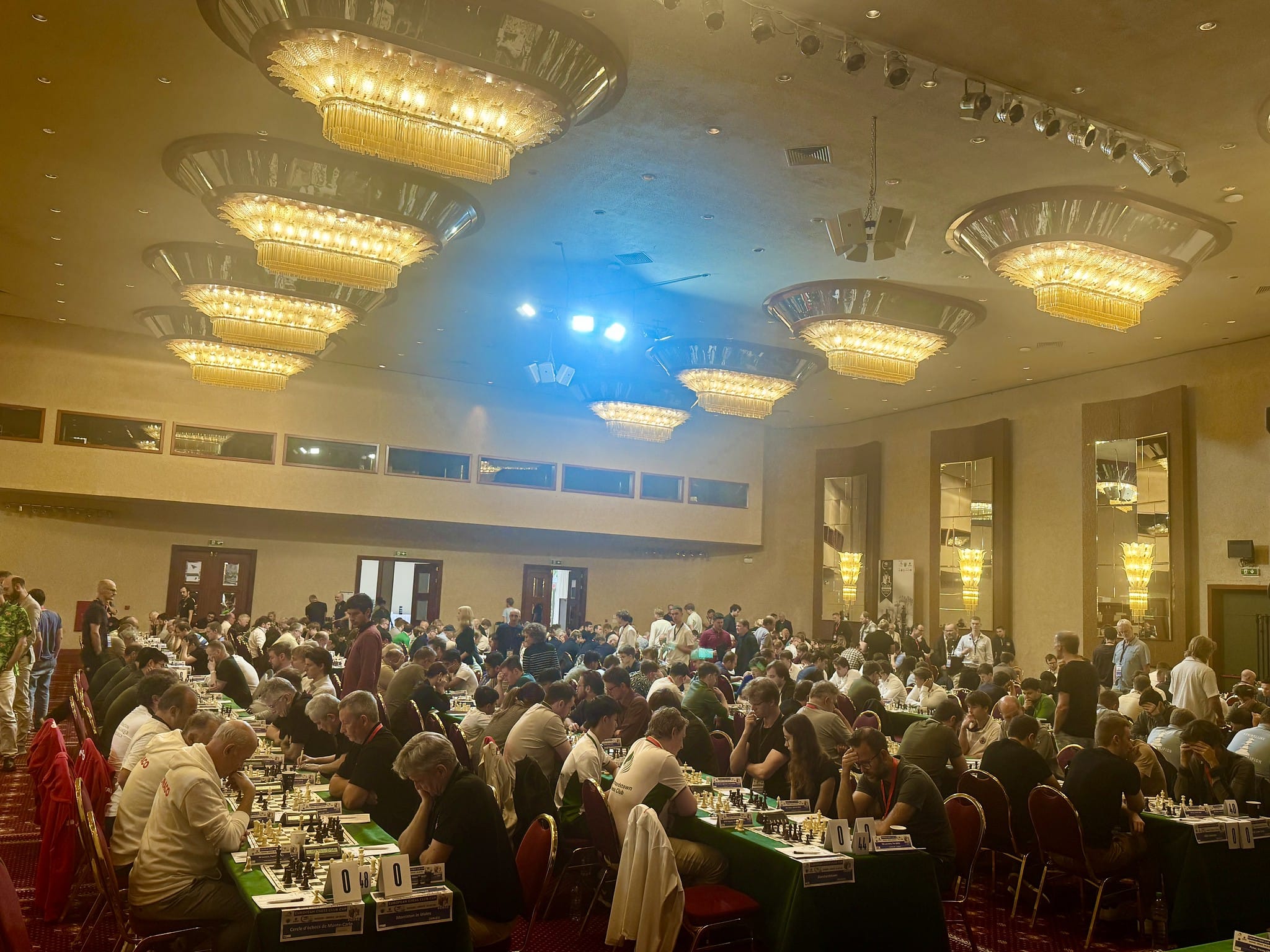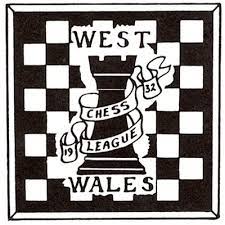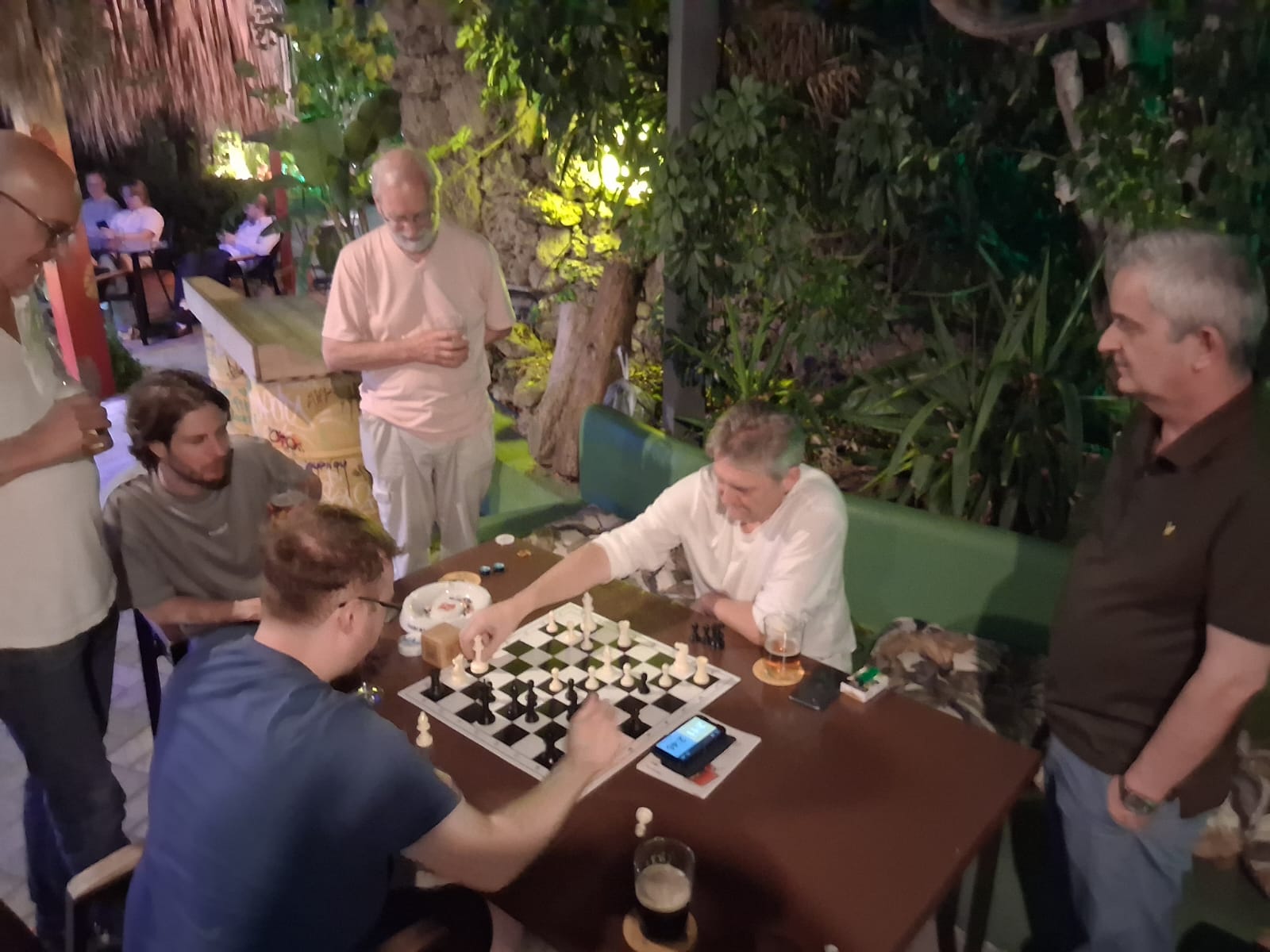
The sun was setting over the Aegean as we stood outside the Rodos Palace Hotel, watching the world's chess elite file past. World Champion Gukesh, the incomparable Anish Giri, rising superstar Arjun Erigaisi—legends whose games we'd studied for years were now sharing our tournament hall for the week ahead. Morriston Chess Club had arrived at the 40th European Chess Club Cup, seeded 101st out of 102 teams. We weren't expected to trouble the scoreboard. But we came to learn, to compete, and to show that Welsh chess punches above its weight.
Round 1: The Upset That Wasn't Supposed to Happen
Aatos (Finland) - Won 3.5-2.5
Our tournament began with a thunderclap. Drawn against Aatos from Finland, the 50th seeds, nobody gave us a chance. But chess has a wonderful way of defying expectations. I secured a win on board 1, Duncan delivered on board 6, and Ian was pressing hard for another victory that looked destined to materialise. When the final results came in, we'd won 3½-2½—the only upset of the entire first round. The tournament hall buzzed with surprise. Who were these Welsh underdogs?
More importantly, our victory catapulted us up the rankings. After round 1, we found ourselves ranked 48th in the tournament—only a few places off the main live boards. The dream run was short-lived, but it meant our remaining fixtures would be against serious opposition. We were no longer playing at the bottom of the tournament. We were fighting with the big boys.
Round 2: The Match That Got Away
Limhamns SK (Sweden) - Lost 5-1
The scoreline looks brutal. The reality was anything but. Against the 27th seeds, we had three separate games where victory was within reach—games that would have turned a 5-1 defeat into a stunning 4-2 upset. This is the cruel arithmetic of elite chess: miss three winning positions, and a draw becomes a drubbing. Sam Brown, competing in his first international event, won an exchange and built genuine winning chances against experienced Swedish opposition. The position was there—the kind of advantage that should convert into a full point. These are the positions you must learn to finish at this level, and while Sam couldn't quite bring it home, the maturity he showed in reaching such a position was remarkable. When the game slipped away, he handled the disappointment with grace and determination. His opponents won't be so fortunate next time.
Andrew gave a grandmaster serious problems on board 4, reaching positions where victory was genuinely achievable. The game became a tactical labyrinth—advantage swapping sides at almost every move. The endgame was so complex that even the GM struggled to find the right path. Watching the post-game analysis unfold, we realised just how many roads led to a Morriston point. On another day, with one or two critical moves falling differently, Andrew walks away with at least a draw, possibly a win. That he pushed a grandmaster to the brink is worth celebrating, even if the result column shows a loss. It is an endgame worthy of study as the variations show it was highly complex and very difficult to play.
Ian's game stayed level deep into the endgame until both players missed a critical f5 break. Once the board settled, Ian had seized the advantage and was pressing for the win. After feeling under pressure for so long, he accepted a draw in what had become a winning position—understandable in the moment, but a point left on the table nonetheless.
Three games. Three winning or drawable positions. Three points left behind. Add them to our scoreline and we're celebrating another upset. That's the brutal education of top-level chess—and we were learning fast.
Round 3: Philosophy Over Pieces
HWP Haarlem (Netherlands) - Lost 5.5-0.5
HWP Haarlem weren't just another club team—they had a secret weapon. Their star member, Loek Van Wely, a 2600-rated grandmaster and former Dutch champion, ran weekly training sessions for all club members. Not occasional coaching sessions—systematic, personal attention from a world-class player who knew each of their games intimately. The difference was evident at the board. Every move felt considered, every plan felt rehearsed. This is what proper chess education looks like. But it was after the final pieces were put away that the real magic happened. In the hotel bar, over drinks with our Dutch opponents, we had one of those conversations that reminds you why chess matters beyond the 64 squares.
Chess, Life, and Getting Inside Your Opponent's Head
We discussed how chess imitates life in profound ways. When chess is played well, you need prophylactic thinking—anticipating what your opponent wants to achieve and preventing it before it becomes a threat. This isn't just about calculation; it's about empathy. You must genuinely understand your opponent's perspective, their desires, their plans. This builds something rare in competitive endeavours: the ability to see through another person's eyes while simultaneously defending your own interests. The decisions you make at the board reveal your personality—are you aggressive or cautious? Do you seek complications or clarity? Do you play the position or the opponent? These same patterns emerge in life decisions. Do you anticipate problems before they arise? Can you balance your ambitions with an understanding of what others need? The 64 squares become a laboratory for decision-making, personality, and human interaction. The conversation with our Haarlem friends, players who'd been trained to think deeply about chess by one of the world's best, gave us all something to ponder long after the pieces were packed away. This is what international chess gives you: not just games, but connections with people who share your passion across borders and languages, and insights that extend far beyond the chessboard. It also made us think: what could Morriston achieve with regular access to a 2600 GM? The Dutch model of strong players giving back to their clubs is something worth aspiring to.
Round 4: Holding Our Own
Sharks 4NCL (England) – Lost 4.5-1.5
The 4NCL is England's premier chess league, and Sharks field strong players on every board. Matteo's excellent win against Ben Purton showed we could compete with established league teams when we played our best chess. When you're the underdog, every victory tastes sweeter—and this one proved we belonged at this level.
Round 5: Facing European Royalty
Cercle d'Échecs de Monte-Carlo (Monaco) – Lost 4-2
This club's pedigree spoke for itself: their women's team would go on to win their eighth gold medal in the European Women's Club Cup. While we faced their experienced men's team, the quality throughout the organisation was evident. Here's what you learn from one game against a strong, experienced player: everything. How they handle the opening, the way they create small advantages from equal positions, their endgame technique that makes draws into wins—it's a masterclass you can't get from books. You must sit across the board and experience it firsthand. And once again, we came achingly close to a result. The 4-2 scoreline doesn't reveal how tight several games were, how a few key moments could have shifted the match in our direction. Against European royalty, we were competitive—just not quite clinical enough when it mattered.
Round 6: The Title Chase
Bloemendaalse SV (Netherlands) - Lost 3½-2½
This was the match that could have changed everything. I rested on board 1 for good reason: Matteo was chasing an FM (FIDE Master) title, and after five rounds, it was still within reach. The rules are strict—to earn a title, you must play all seven games of the tournament. Matteo reached a comfortable position against Dick De Graaf and could have settled for a draw, which would have tied the match. But when you're chasing a title, you can't play for safe results. You must press, take risks, create winning chances. On move 27, he played 27...Qxb3, missing a tactical blow, and the game ended quickly.
These are the heartbreaking choices in chess: play safe for the team result, or take calculated risks for the individual goal? Matteo made the brave choice. It didn't work out for the FM title, but his performances throughout earned him the CM (Candidate Master) title—a significant achievement and a stepping stone to future success. Moss delivered a clinical performance, using a stonewall setup to keep his opponent under constant pressure before converting his attack into a smooth endgame win. Beautiful chess.
Round 7: So Near, Yet...
CE Gambit Bonnevoie #2 (Luxembourg) - Drew 3-3
Our final round served up both satisfaction and frustration in equal measure. A draw was respectable, but we had winning positions in multiple games—any one of which would have delivered a 4-2 victory and lifted us significantly in the final standings. My own game against Ivan Pryvalov still haunts me. For some inexplicable reason, I underpromoted a pawn instead of playing the obvious queen promotion, throwing away a winning advantage. This should have been a straightforward full point and a match victory.
Moss had a lovely game against Ilgar Halafov and could have sealed the win. After a tense battle and a few missed opportunities, it ended in a draw. Had either of us converted, we'd have won the match 4-2 and climbed several places in the final standings.
So close. So frustratingly close.
Team Spirit: Sam Brown's Sacrifice
Before we left for Rhodes, we'd planned our campaign carefully. We were a squad of seven players, and fairness dictated that everyone should play six games, with each player taking one day off to rest. But FIDE title regulations add a complication: to qualify for a title, you must play all seven games. No exceptions. When it became clear that Matteo had a genuine chance at the FM title, Sam Brown made a decision that speaks volumes about his character. Without hesitation, he volunteered to take a second day off—playing only five games instead of six—so that Matteo could play all seven and chase his title dream. This is team spirit at its finest. While his teammates battled at the boards, Sam spent an extra day exploring the medieval streets of Rhodes Town, cheering on the team from the sidelines, secure in the knowledge that he'd given his teammate the best possible chance. It's easy to talk about being a team player. It's harder to give up your own opportunity when it matters. Sam did exactly that. Though Matteo narrowly missed the FM title, he secured the CM title thanks in part to Sam's selflessness. That's the kind of sportsmanship that makes a club more than just a collection of individuals—it makes it a family. And for those wondering: yes, Sam thoroughly enjoyed his extra day in Rhodes Town. But more importantly, he showed everyone what it means to put the team first.
Sam Brown: First International Tournament
Sam deserves additional recognition beyond his generous sacrifice. Playing in his first international tournament as our youngest team member, he faced experienced opposition in every round—and competed with distinction. In Round 2, he won an exchange against experienced Swedish opposition and built excellent winning chances—a position many seasoned players would struggle to achieve. Several other games featured near-misses and could-have-beens, positions where a single move would have changed everything. These losses aren't failures; they're investments. The experience of competing at this level, of holding winning positions against international players, of learning what separates "good" from "excellent"—this is how champions are forged. Sam impressed us all with his resilience, fighting spirit, and selfless attitude. Give him a year or two, and his opponents won't be so fortunate.
The Chess That Never Stops
The official games ended at varying hours, but the chess continued long into the Rhodes nights. The bar became our second playing hall, where amateurs and grandmasters alike gathered for blitz games and analysis sessions. Positions from the day's games were dissected over cold drinks, with players of all levels sharing ideas and improvements.
These informal sessions were as valuable as the tournament games themselves.
Cultural Confusions
We quickly discovered that chess pieces aren't universal. Back in Wales, our knights have flowing manes—proper horses, if you will. The Greek knights, however, had rounded ears and peculiar proportions that left us convinced we were playing against an army of Scooby-Doo pieces. It took a round or two to stop doing double-takes at the board! Unfortunately, nobody captured photographic evidence of these mysterious creatures, so this is the closest approximation we could find.
What We Learned
Playing at this level is invaluable experience. We saw firsthand how the world's best players prepare—many of our opponents knew our repertoires in detail, having analysed our games beforehand. The difference in theoretical knowledge, pattern recognition, and endgame technique was stark but educational.
The scoreline shows 1 win, 1 draw, and 5 losses. But the games tell a different story entirely. Look at the positions featured in this article alone: Sam's exchange up against Sweden. Andrew pushing a GM to the limit. Ian's winning endgame accepted as a draw. Three potentially winning or drawable games in Round 2 that would have delivered an upset. Matteo's brave but unsuccessful title chase. My inexplicable underpromotion throwing away a win. Moss's near-victory in the final round. These aren't the games of a team that simply got outplayed. These are the games of a team that was competitive, creative, and fighting, but not quite clinical enough when it mattered most. For our younger players like Sam, these games were worth more than a year of club chess. You don't improve by playing opponents at your level; you improve by being tested beyond your limits. For Matteo, chasing a title while carrying team hopes was a lesson in competing pressures—and he came away with the CM title as proof that hard work pays off. For all of us, it was a reminder that chess, like life, rewards not just good positions but good decisions.
Final Thoughts
We finished 97th out of 102 teams. On paper, that looks like we were simply outclassed. The games tell a different truth.
- Round 1: We pulled off the tournament's only first-round upset, vaulting to 48th place.
- Round 2: Three winning or drawable positions. Convert just two of them, and we upset the 27th seeds.
- Round 5: Competitive against Monaco's European championship-quality club, pushing them harder than the scoreline suggests.
- Round 6: A 3½-2½ loss where the match result hung in the balance.
- Round 7: Two winning positions in hand. Convert either one, and we win 4-2.
By our count, we had realistic chances to win four or five matches if key positions had been converted. The difference between our final placing and a genuinely impressive tournament wasn't a massive gulf in ability—it was a handful of critical moments where we couldn't quite find the killer move. That's not a failure. That's a roadmap. We also:
- Gained invaluable experience against international competition
- Had philosophical discussions about chess, empathy, and life with opponents from across Europe
- Demonstrated true team spirit when Sam sacrificed playing time for Matteo's title chance
- Celebrated Matteo earning his CM title
- Forged stronger bonds as a team
- Returned home with stories, lessons, and renewed motivation
To any chess club considering the European Club Cup: do it. Yes, you'll likely lose most of your matches. Yes, the competition is fierce. But the experience of playing in a different country, testing yourself against the world's best, analysing your games with grandmasters in the bar afterward, discovering that you're more competitive than the final standings suggests irreplaceable. We went to Rhodes outgunned but not outfought. The fighting chess shown in these games proves we can compete at this level. Next time, we'll be the ones converting those winning positions. Next time, those near-misses will be victories. We left as better players, deeper thinkers, and prouder representatives of Welsh chess.


